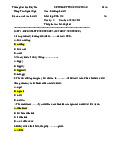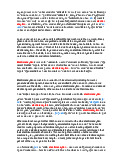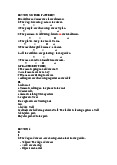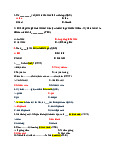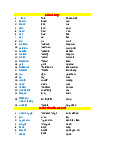









Preview text:
Học liệu từ xa môn Nói 3 – Nguyễn Thị Diệu Trâm
5 ĐỀ BÀI TẬP MẪU
(CÓ ĐÁP ÁN THAM KHẢO VÀ THANG ĐIỂM) THANG ĐIỂM
Mỗi đề bài tập gồm 2 phần, với thang điểm như sau: I. DESCRIPTION ( 3 điểm) 1. Nội dung: 2 điểm
2. Phát âm và ngữ điệu: 0.5 điểm 3. Cấu trúc diễn đạt: 0.5 điểm II.
QUESTIONS FOR DISCUSSION (7 điểm ) 1. Nội dung: 3 điểm 2. Lưu loát và tự tin: 1 điểm
3. Phát âm và ngữ điệu: 1 điểm 4. Ngữ pháp: 1 điểm 5. Thuyết phục: 1 điểm ĐỀ 1: I. DESCRIPTION
List some of the differences between men and women you can think of. II.QUESTIONS FOR DISCUSSION
1. In your opinion, what’s the best/worst part about being a man or a woman?
2. “Men make houses, women make homes”. Is that true? ĐỀ 2: I. DESCRIPTION
The most expensive thing/object that you have ever had II.QUESTIONS FOR DISCUSSION
1. How important is money to you? 1
Học liệu từ xa môn Nói 3 – Nguyễn Thị Diệu Trâm
If you had no money, do you think you could be happy?
2. Share your thoughts about the following saying:
'Money is a good servant, but a bad master' ĐỀ 3: I. DESCRIPTION
Please list five important life skills at school you should learn? Tell the reasons for your choice. II. QUESTIONS FOR DISCUSSION
1. The most successful people in life are not always the best educated. What do you think?
2. In life, experience and ability are more important than qualifications. Do you agree or not? Explain. ĐỀ 4: I. DESCRIPTION
What is a(n) nuclear family/extended family/single-parent family/blended family? II. QUESTIONS FOR DISCUSSION
1. Should the mother or the father be the head of the family? What roles do the
mother and father play in your society?
2. In your view, were the families of long ago healthier or happier than modern families? Why or why not? ĐỀ 5: I. DESCRIPTION
Describe the person whom you like best. II. QUESTIONS FOR DISCUSSION
1. What influence does someone’s physical appearance have on their personality? And vice versa?
2. Share your thoughts about one of the following famous sayings:
“Beauty is in the eye of the beholder.” 2
Học liệu từ xa môn Nói 3 – Nguyễn Thị Diệu Trâm
“Beauty is not in the face; beauty is a light in the heart”.
“Beauty is the promise of happiness”. GỢI Ý TRẢ LỜI ĐỀ 1: I. DESCRIPTION
- Females can verbally express their emotions better than males.
- Males are more likely to take risks.
- Females are easier to startle.
- Women also exhibit a stronger emotional response to the anticipation of pain.
- Males are more likely to overestimate their ability.
- Males are more likely to exhibit aggression physically while females are more
likely to exhibit aggression verbally.
- Women read subtle emotion better than men. II.QUESTIONS FOR DISCUSSION
1. The best part of being a man:
- Men remain (relatively) attractive later in life.
- Men are less likely to suffer from depression.
- Men are less likely to suffer from anxiety disorders.
- Men are better able to defend themselves against physical assault.
- Men are more likely to become high-ranking political officials, or CEOs of large companies.
The best part of being a woman:
- Women have much freedom in terms of what they wear to the office. They’re not
limited to a boring pair of khakis, or the same stifling suit (no matter how hot they may look).
- Women are able to conceive, carry, and give birth to — or adopt and mother as
their own — another human life.
- Unlike men, women are permitted incredible wiggle room to use all sorts of
paints and enamels and pastes and potions to build a beautifully deceptive fantasy atop their natural appearance.
- Women are allowed to cry. What happens when a woman cries? A hundred
people console her. What happens when a man cries? A hundred people laugh at him. 3
Học liệu từ xa môn Nói 3 – Nguyễn Thị Diệu Trâm
- Women live longer than men do.
- Women are not expected to be successful.
2. “Men make houses, women make homes”. Is that true?
- Men are often the ones who build or acquire houses for their families, but women
provide the things that make a house into a home.
- The husband may buy, or even build, the house, but it only becomes a real home
when it is made warm and comfortable by the wife.
- As the soul of the home, the wife takes care of everything: children, kitchen,
cleaning, atmosphere, family relationship etc. ĐỀ 2: I. DESCRIPTION Think about: - what it is - on what occasion you have it - how it is important to you II.QUESTIONS FOR DISCUSSION
1. How important is money to you?
- The importance of money in human life is similar to the importance of food for
the body. Just like you can’t live even for a few days without food, you can’t
survive for long without money.
- You can definitely solve most of your problems of life if you have unlimited
supply of money. If you have lots of money:
You won’t be facing basic problems of life like food, water, shelter or clothing.
You can buy all items for your comfort like house, air-conditioners, TV
and other household goods to live comfortably.
You can engage many servants to take care of you and live like a king.
- The only problem is that money does not come just like that to any person by any
amount of wishing, praying or wanting. You have to work hard and compete with
fellow human beings to earn money as the supply of money is limited in this world
but the demand for money is unlimited.
2. The saying:
'Money is a good servant, but a bad master' 4
Học liệu từ xa môn Nói 3 – Nguyễn Thị Diệu Trâm
Money is an essential, almost indispensable article in the present day world. It is
the ’money’ through which we can purchase all the necessary comforts and
amenities of life. If you have money, you can obtain what seems impossible to
others. It is the money which gives man confidence, creditworthiness, credentials,
capacity, capabilities and courage. In present day materialistic world, money has
become very powerful. In the present day corruption, cut throat competition,
callous degradation of moral and ethical values, are for the sake of grabbing and
accumulating more and more money. One’s prestige, respect, social status is
calculated per his monetary status.
Time has gone, when we valued a person in evaluation of his moral and ethical
values. People were earlier known for keeping their words, for donating every
thing to a donee. Now people are known in terms of their ranking in the list of the
rich of the world. Money has become the centre of all activities. Money and
muscle power have become essential ingredients of a successful political leader.
Money is regarded as omnipotent by a few people, particularly by the poor. As
whatever one does not possess, one aspires it badly, and it becomes mono aim of
achievement. For the rich, who own lots of money, still crave to earn more and
more, by hook or by crook, with fair or foul means, without caring even for their
own health, own family. They are the servants of money, earning money not for
the sake of themselves but for the sake of money and a time comes they find
themselves unable to use the money for their happiness. They are unable to eat,
unable to taste the most delicious dish, unable to move, walk or enjoy because
they suffer from many diseases which are the result of their undue craving for
wealth at the cost of health. Can one purchase anything with the power of money?
No, one cannot. You cannot purchase inner satisfaction with money; you cannot
purchase the lost youthfulness with money; you cannot purchase time from the death at any cost. ĐỀ 3: I. DESCRIPTION
- Managing Money (the right way): Schools like to teach finance, accounting, etc
but they fail to emphasize the importance of saving, how to keep your own budget,
how to manage your own money, and how our tax system works.
- Mental Health: There is an immense amount of controversy today about mental
health. By emphasizing this as a topic of required learning and discussion, students
would go into the real world not just with much more understanding of each of the 5
Học liệu từ xa môn Nói 3 – Nguyễn Thị Diệu Trâm
primary mental illnesses and medical or holistic approaches that could help them,
but with a better understanding of themselves. If you know what the issue is within
yourself, you can find a way to fight it. There is therefore great value in learning
more about this. Let’s start placing more emphasis on educating our children on
mental health so that our future generations can live happier and more fulfilling
lives and achieve what they are capable of.
- Dating and Romantic Relationships: Nothing is more saddening than people
who continue to get straight A’s in school, pile on the electives, build great
resumes, yet have forgotten or never realized the meaning of love. Many people
lose out on love simply because they don’t realize that indeed there is much to
learn about falling into, maintaining, and flourishing in dating and romantic
relationships. There is a lack of knowledge today on attachment theories, what
romance means to people, the rules of dating (are there rules?), and the meaning of
love. If this was focused on more in schools I strongly feel we’d be more prepared
for “the one” when he or she comes along.
- Marriage, Family, and Raising kids: Marriage, family, and kids are hard work.
There are many many wonderful things about family, but it has a lot of ups and
downs. Maintaining a marriage over the course of several decades (or more) can
be very hard work. Only an intense understanding of love, connection, and the
depths of its meaning can bond two people for a relationship’s longterm course.
Raising a family is no easier. Ask anyone raising a newborn, toddler, or teen and
most will tell you there was so much to learn that they didn’t know prior. There’s
much to be learned in the real world about marriage, family, and children that we
didn’t know anything about upon leaving school.
- Professional Etiquette / Manners: There’s so many people in the work place who
are frankly clueless about how to write good emails. They are also horrible at
handling themselves in a formal or professional setting and are bad communicators.
Communication is critical in so many corners of life. Courses in our schools
implementing professional work etiquette would be extremely beneficial. It can be
as simple as writing a thank you card after a job interview to using proper notation
in a professional correspondence. II. QUESTIONS FOR DISCUSSION
1. The most successful people in life are not always the best educated. What do you think?
These are some of the most successful people without the best education: Bill
Gates, Albert Einstein, Abraham Lincoln, Winston Churchill, Henry Ford ect.
They performed poorly at school, yet they became big names thanks to their
talents, skills, effort, will etc.
2. In life, experience and ability are more important than qualifications. Do you 6
Học liệu từ xa môn Nói 3 – Nguyễn Thị Diệu Trâm
agree or not? Explain.
Nowadays everyone seems to have a or wants to have a degree, and there is still a
tendency to jump straight into starting one as soon as possible. But is it the right
way to go? A degree qualification used to be a major deciding factor in who got
the job, but I think as more and more people have gained degrees, especially over
recent years, employers have become less impressed on the whole, and
focused more on experience and ability. If you asked most employers if they
would select a raw graduate with 3 years in education but no tangible experience,
or a college leaver with 3 years relevant experience, I would expect the vast
majority would favour the latter. When reviewing CVs, both personally and
alongside employers, experience is reviewed before education in most cases, apart
from entry/junior level positions. A 3-year study-only degree doesn’t really work,
so apprenticeships are starting to become much more commonplace within this
sector, along with other workplace learnings. Obviously this differs in some
vocations where a certain level of education is required to progress beyond a
certain point, i.e. law, accountancy, engineering etc. The ideal is a good
combination of both theoretical knowledge and practical understanding, and I
believe this is better. However, from what I see on a day to day basis, the comfort
blanket of seeing an individual with the exact match of experience to a vacancy
swings an employer in most circumstances. ĐỀ 4: I. DESCRIPTION
Nuclear family: a family group that consists only of parents and children.
Extended family: a family that extends beyond (bi-an-d) the nuclear family,
consisting of parents, aunts (en-t), uncles, and cousins (cơ-zần), all living nearby
or in the same household. An example is a married couple that lives with either the husband or the wife's parents.
Single-parent families: families with children under age 18 headed by
a parent who is widowed or divorced (đi-vôt-d) and not remarried, or by
a parent who has never married (me-rì).
Blended family: a family that includes children from a previous marriage
(me-rit-d) of the wife, husband, or both parents. 7
Học liệu từ xa môn Nói 3 – Nguyễn Thị Diệu Trâm II. QUESTIONS FOR DISCUSSION
1. Should the mother or the father be the head of the family? What roles do the
mother and father play in your society?
Mothers are more important
A mother has an undetectable bond with her child, unlike many fathers. She
always does her best, to make her family happy. Mothers always sacrifice a lot, for
the happiness of her husband and children. She can have a job, and still take care
of everything else, from cooking, looking after the children, maintaining the
house. Fathers usually go to jobs, and return home for dinner, and that's usually the
case in almost every family. Yes, fathers do care about their children, but cannot
do many things, like the mother can to her child. When a child is emotionally hurt,
or confused, it is the mother he goes to for answers, and to feel good about them.
The mother also has a deep emotional attachment with her children, unlike the
fathers. A child does need both the parents to grow up, at different stages of his
life, but even in an unfortunate case of having a single parent; he/she would
always prefer their mother over father.
What roles do the mother and father play in your society?
The father’s role: For generations and throughout cultures, a man’s responsibility
has been to protect the women and children under his care. This includes not only
physical protection but also financial provision and the display of healthy authority in the home.
The mother’s role: giving births, taking care of the whole family, bringing up children, earning money ect.
2. In your view, were the families of long ago healthier or happier than modern
families? Why or why not?
- The members of traditional families enjoy better physical health, less mental illness.
- Children enjoy more loving and cooperative relationships and report less
physical or sexual violence. Children brought up in traditional families are far
better socialized than those raised in modern homes. 8
Học liệu từ xa môn Nói 3 – Nguyễn Thị Diệu Trâm
- Moreover, when the bonds between parents and children are more positive, drug,
alcohol and tobacco use is lower; children are better socialized and cooperative,
they commit fewer crimes and they perform better in school. ĐỀ 5: I. DESCRIPTION
Think about: - who he/she is - why you admire him/her II. QUESTIONS FOR DISCUSSION
1. What influence does someone’s physical appearance have on their
personality? And vice versa?
It all depends. These two can interact and affect each other, negatively and
positively, it all just depends on who is wearing what features.
Someone who is good looking and always has been may, generally, be less quirky,
they may like pop culture, may find it easy making friends.
Someone who is less attractive may have an extremely interesting personality built
as a mechanism to let people in because their looks couldn’t do that for them growing up.
There are dozens of variables. If you suddenly get hot, you may become a dick
because you can. If you suddenly become ugly, you may have decreased self-
esteem. People’s identities can’t help but be formed in part by their appearance, as
the way people perceive you are the first real self-aware thoughts anyone really gets.
2. Share your thoughts about the following famous saying:
“Beauty is in the eye of the beholder.”
- Any judgement of beauty is subjective.
- Different people have different views on what is beautiful.
- That which one person finds beautiful or admirable may not appeal to another.
- Beauty is an abstract and everyone has a different view of it. An elderly man
can look at his wife of many years and see beauty in her face, partially because of 9
Học liệu từ xa môn Nói 3 – Nguyễn Thị Diệu Trâm
the aura of all she has been to him. A younger man walking by might just see a
pleasant enough old woman, but no beauty at all.
- “Beauty is in the eye of the beholder” is an old English term meaning that
people have different opinions of many things, so there is no such thing as true
“beauty.” For example: some people like tall women, some people like short, some
people like skinny, some people like bigger women. Beauty is all whatever one
makes it out to be. There is no set standard or definition for beauty, as everyone’s mind works differently.
- The perception of beauty is subjective and cannot be objectively quantified.
We know it when we see it, even if we can’t define it. Not all people will define
beauty in the same way. What one person considers “beautiful” may be only
somewhat attractive, or even ugly, to others. There can be serious disagreements
about what is beautiful in art or architecture, for example. It’s an individual’s life
experiences that form and guide opinions of attractiveness, and a person’s opinion
about what is beautiful may change over time. 10
